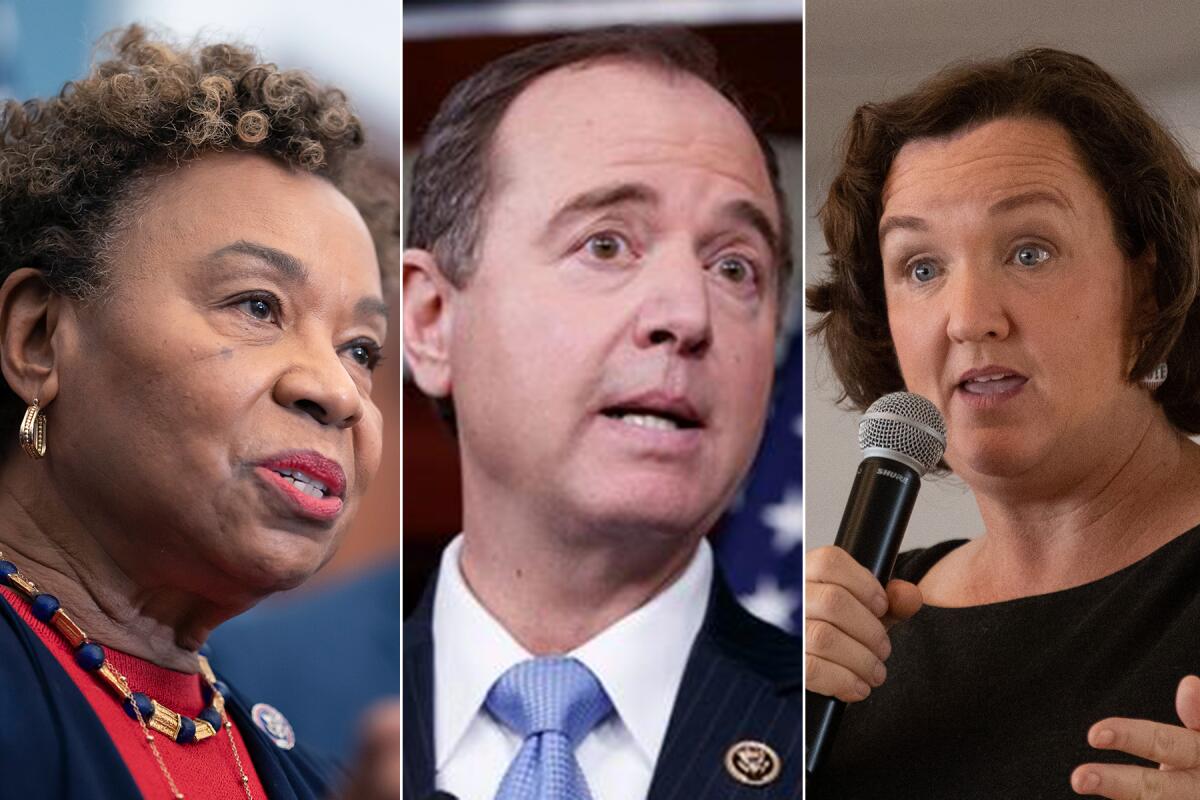Past donors to Reps. Adam Schiff, Katie Porter and Barbara Lee face a dilemma in Senate race

Pennsylvania retiree Robin Bernstein sent thousands of dollars across the country to help California Democrats Katie Porter and Adam B. Schiff win their congressional reelection campaigns last year.
So when both Porter and Schiff jumped into the 2024 race to succeed retiring Sen. Dianne Feinstein, Bernstein faced a quandary of whom to back. Schiff took the prize, and her $250 campaign donation, in part because of his “incredible” effort during the first impeachment trial of former President Trump, she said.
“I like Katie Porter. This is not anti-Katie Porter. But this is a choice of who do you like the best,” said Bernstein, 74, a retired political consultant. “I just see him as being more ready to be a senator.”
Bernstein is among thousands of donors who donated to at least two of the main Democratic Senate candidates’ 2022 congressional campaigns. Schiff of Burbank, Porter of Irvine and Rep. Barbara Lee of Oakland largely agree on policy and their voting records are nearly identical, so it’s not surprising that they have been financially supported by many of the same donors in the past.
But now — as the trio battle to replace Feinstein and try their best to differentiate themselves — an analysis of these shared donors offers insight into how voters are parsing the subtle differences among the 2024 Senate candidates.
Overall, 44,300 people contributed at least $200 to the congressional reelection campaigns of Schiff, Porter and Lee last year, according to campaign finance reports filed with the Federal Election Commission. Among those, 3,800 forked over donations to at least two of them — and they are the ones facing the dilemma of which Democrat to back in California’s 2024 Senate race.
So far, Schiff has emerged as their clear choice.
Among the donors who gave to multiple candidates last election and have thrown money into the Senate race, more than half have backed only Schiff’s bid, donating more than $380,000, according to fundraising disclosures filed with the Federal Election Commission. About a quarter backed Porter’s campaign with $130,000 in donations and less than 5% contributed to Lee, totaling about $64,000. One in six donated to two or all three of the Senate candidates, federal election records show.
Catherine Calvy, 74, of Orange wasn’t engaged in politics for decades until Trump was elected in 2016. She donated $880 to Porter’s congressional campaign in 2022 and $460 to Schiff’s, federal election records show.
As she weighed whom to support in next year’s Senate race, she worried that Schiff’s high-profile roles in Congress, including as lead prosecutor in Trump’s first impeachment trial, will make him less electable than Porter. And she appreciated watching Porter, a former UC Irvine law professor, explain complex issues in easily understandable ways.
She particularly liked Porter’s grilling of Jamie Dimon, the chairman and chief executive of JPMorgan Chase, during a 2019 House Financial Services Committee hearing. The congresswoman pulled out her familiar whiteboard and asked how a Chase bank teller in Irvine could make ends meet with $29,100 in take-home pay.
“Maybe it’s just me, but I think people see him as a politician, and they see her as a teacher with a white board,” Calvy said of Schiff and Porter. “She uses that very effectively.”
Calvy said she wasn’t as familiar with Lee, who is better known in her home base of Northern California. She said she would like to see California elect a female senator to replace Feinstein.
Porter is “a woman who I share political opinions with,” she said, and Schiff is “a man that I share political opinions with. The deciding factor is that she’s a woman.”
Gender, geography, race, age and biography are all factors that could shape the race, which currently does not have a well-known GOP candidate.
Feinstein and retired Sen. Barbara Boxer were trailblazers when the Democratic women were elected to the U.S. Senate in 1992, the so-called “Year of the Woman.”
A then-record number of women were elected to the chamber in the aftermath of the contentious 1991 Senate confirmation of U.S. Supreme Court Justice Clarence Thomas, which featured sexual harassment allegations from Anita Hill. Hill, who worked for Thomas, accused him during televised confirmation hearings. Thomas vehemently denied the allegations, saying that white liberals were trying to block a conservative Black man from being seated on the Supreme Court.
The Senate narrowly confirmed Thomas on a 52-48 vote.
The legality of abortion was also a front-and-center issue at the time, as the Supreme Court debated and ultimately denied an attempt to overturn Roe vs. Wade, the landmark 1973 ruling that the Constitution protected the right to have an abortion. The issue is once again crucial because the Supreme Court overturned federal protection of abortion rights in 2022.
The Senate primary election is still seven months away, but trends among donors who previously supported two or more of the top Democratic candidates reflect the overall fundraising battle in the race.
Schiff raised $8.2 million in the second quarter of 2023, roughly double the combined total raised by Porter and Lee. His donation total has been partly fueled by his June censure by congressional Republicans over his role in investigating Trump’s ties to Russia, a reprimand he has repeatedly highlighted in fundraising appeals.
The three Democrats have raised a total of $36 million in their Senate campaigns from donors, authorized committees and transfers from their congressional committees in the first six months of this year. Of that amount, $24.3 million came from individual donors. The Federal Election Commission requires donors to be identified if they contribute at least $200.
California’s costly intraparty slugfest comes at a time when Democrats would prefer to invest those millions in races to beat Republican incumbents or strong challengers and hold on to control of the Senate, said Jessica Levinson, an election law professor at Loyola Marymount University.
“In terms of bang for your buck in the balance of power in the Senate, spending money in California is not quite throwing money in a black hole, but it’s close,” she said. “Democrats at the national level — every time they see another $1 million being spent on the race in California, it is like they are watching the money being set on fire in the middle of the state.”
Both Porter and Schiff have proved to be prodigious fundraisers, in part driven by their regular appearances on liberal media shows and mastery of using social media to go viral — such as a picture of Porter casually reading the book “The Subtle Art of Not Giving a F—” during the House speaker fight earlier this year.
In the 2022 congressional election, Porter raised $26 million, behind only now-House Speaker Kevin McCarthy (R-Bakersfield), and Schiff raised $25.4 million, behind McCarthy, Porter and then-House Speaker Nancy Pelosi (D-San Francisco).
Lee, who has represented one of the nation’s most liberal districts in Congress for a quarter-century, does not have a history of raising these types of sums. She collected $2.2 million in that election cycle.
But among the donors who contributed to multiple Democrats in the 2024 Senate race, she too has fans, who often mention her lone vote to oppose giving then-President George W. Bush broad war authority in the aftermath of the 9/11 terrorist attacks.
“She’s one of the few who sees through the whole Pentagon thing,” said Berkeley resident Nancy Schimmel, 88. “Most of the Democrats, as well as all the Republicans, give the Pentagon more money than they even ask for, and certainly more than they need. That really is the subject matter that I really depend on her for.”
The singer-songwriter, the daughter of “Little Boxes” folk singer Malvina Reynolds, had previously contributed to Lee‘s and Porter’s congressional campaigns. When both women announced that they would seek to replace Feinstein in the Senate, Schimmel settled on supporting Lee, who has been her representative in Congress for 25 years.
Schimmel donated $1,075 to Lee’s campaign in the 2022 election cycle. She has since contributed $500 to Lee’s Senate campaign.
The longtime peace activist organized anti-nuclear marches in the 1960s and sings in an activist group called Occupella, which started during the Occupy movement in the Bay Area.
“I didn’t get more conservative as I aged,” Schimmel said wryly.
Other donors are struggling over whom to support.
“There’s never been so many good people all running for the same office,” said Jeremy Stone, an art advisor and appraiser who lives in Kensington in the Bay Area’s Berkeley Hills.
In last year’s midterm contests, Stone donated $25 to Lee, her representative in Congress; $550 to Porter; and $525 to Schiff. She said she was torn over the Senate race.
Stone admires Schiff for acting as “the ethical and moral compass of the government” during the Trump administration. She likes that Porter “educates people every time she speaks,” and comes prepared to congressional hearings.
But at 49, Porter still has decades of opportunities ahead of her, she said. Lee, on the other hand, is 77, with a long history of standing on principle, even when it is unpopular, Stone said.
Because of Lee’s age, and the rarity of an open Senate seat in California, this election “is probably Barbara Lee’s only chance to become a senator,” Stone said.
Initially, Stone settled on voting for Lee. But she rethought her decision, fearing that Lee won’t have enough support “from mainstream Democratic power” to win. Instead, she said, she plans to vote for Schiff.
Some donors haven’t made a decision. A handful have contributed to all three candidates.
Alan Solomont, a former U.S. Ambassador to Spain and Andorra during the Obama administration, contributed $1,000 each to Lee, Porter and Schiff in March, federal records show.
“I know each of them and I have enormous regard for each of them,” said Solomont, who lives in Boston. “On some level, it’s too bad that three such good people are competing for the same office, and we’ll lose two of them. But I certainly hope one of them will be the next senator from California.”
More to Read
Get the L.A. Times Politics newsletter
Deeply reported insights into legislation, politics and policy from Sacramento, Washington and beyond. In your inbox three times per week.
You may occasionally receive promotional content from the Los Angeles Times.













